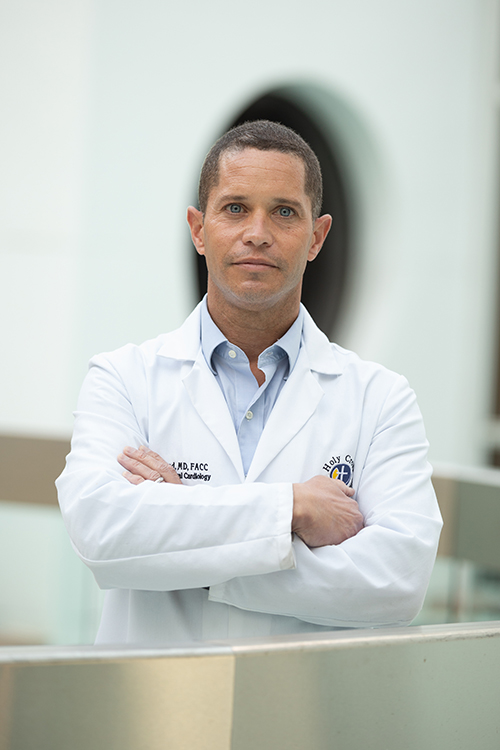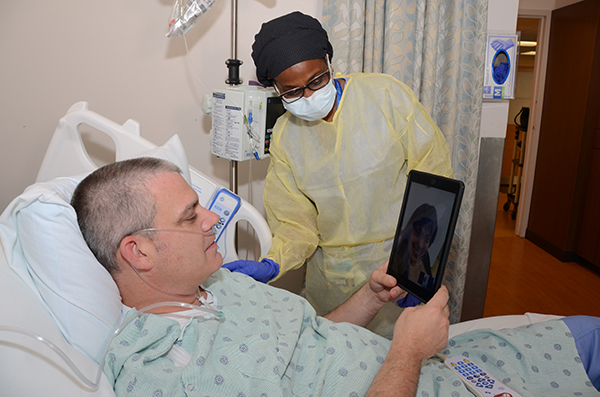By Tom Tracy - Florida Catholic
FORT LAUDERDALE | With public health officials warning that COVID-19 vaccination rollouts won’t do much to tame the immediate dangers of the pandemic, Holy Cross Hospital is looking at medications and protocols to save and protect lives.

Photographer: TOM TRACY | FC
Dr. Joshua Larned is medical director of the Congestive Heart Failure program at Holy Cross Hospital in Fort Lauderdale, and a past research fellow at both the Centers for Disease Control and National Center for Infectious Diseases in Atlanta. Holy Cross is taking part in two clinical trials to gauge whether some therapies lessen the complications associated with COVID-19, the illness caused by the coronavirus.
The U.S. continues to lead the world in the number of reported deaths attributed to COVID, reaching a milestone of 300,000 deaths in mid-December while rapidly expanding hospitalization numbers are putting stress on many regions.
“This is obviously, in many of our lifetimes, the most significant impact to public health, even to the point of disruption across the healthcare system,” said Dr. Joshua Larned, cardiologist with Holy Cross Medical Group and a member of Holy Cross Hospital’s steering committee on COVID-19 management.
“What we are seeing here is something that happened very quickly without a lot of initial understanding of how quickly the spread could occur; and we were a little behind in terms of processes to deal with it, in spite of other respiratory lessons from SARS or MERS. This one caught the world off guard,” said Dr. Larned.
He is medical director of the Congestive Heart Failure program at Holy Cross and a past research fellow at both the Centers for Disease Control and National Center for Infectious Diseases in Atlanta.
“One of the problems with COVID-19 is the fact that it doesn’t just cause pneumonia. It can also be associated with a respiratory distress syndrome, a multi-inflammatory syndrome that can affect a multitude of different organ systems including the heart. It can be associated with thrombosis where the body wants to form clots, and is associated, in its more severe form, with multi-organ failure,” he said.
Holy Cross Hospital has been taking part in a study to see if administering high doses of anticoagulants, or blood thinners, will safely reduce the risk of COVID patients developing deadly clots. The study is being done in collaboration with researchers at Brigham and Young Women’s Hospital and Harvard Medical School.
Blood clots are one of the things that makes patients with COVID severely ill, with clots forming either in the major arteries or veins leading to the lung and other parts of the body, according to Dr. Larned.
He added that many patients with even mild to moderate COVID, who are never hospitalized and will recover, may experience lingering chronic fatigue, shortness of breath, excessive heart rate or long-term damage to lungs and heart.
ANTICOAGULANTS
Holy Cross is running two clinical trials where COVID patients in the Intensive Care Unit receive high doses of two different anticoagulants — used together — to prevent arterial and venous clots.
“We hope that antithrombotic treatment reduces the risk of having a clotting disorder,” Dr. Larned said.
Another clinical trial involves patients not in ICU but admitted to the hospital with COVID who randomly receive an anticoagulant. “This is just one drug not two drugs used together,” Dr. Larned said.
“Anecdotally, I can say the risk of having a blood clot in an artery or vein is a devastating disease that can occur to any sick patient who is admitted to a hospital, but we know the risk of that happening goes up significantly with COVID infection. And anecdotally we can say that patients who get aggressive antithrombotic care have less risk of having thrombosis and adversity,” he added.
While the number of COVID infections in Broward County has been somewhat dwarfed by those in Miami-Dade, Holy Cross moved quickly last spring to prepare for the pandemic and managed to continue normal operations and regular patient care while also accommodating patients sick with coronavirus.

Photographer: COURTESY
A nurse helps a patient speak to relatives via video call in the midst of the COVID-19 pandemic. Holy Cross is taking part in two clinical trials to gauge whether some therapies lessen the complications associated with COVID-19, the illness caused by the coronavirus.
“We separated floors, we created teams, we came up with processes to manage COVID in the hospital and then we conceptualized pathways to manage patients in our health system who may come into the emergency room or who develop COVID — to come up with management protocols for patients out of the hospital and what their risks of getting hospitalized were,” Dr. Larned said.
Limited COVID testing capacity made the spring an especially difficult period. The peak hospitalizations at Holy Cross arrived in June, July and August. While there is growing concern that early next year may see a return to those levels of hospitalizations, that scenario has not yet arrived at Holy Cross, according to Dr. Larned.
MONOCLONAL ANTIBODIES
There is also not a universal agreement on outpatient care for COVID patients who are not sick enough to require hospitalization. Some Holy Cross patients have qualified for medical trials with the antiviral drug remdesivir, as well as convalescent plasma, anti-inflammatory and other drugs.
Another potential therapeutic the hospital is studying is monoclonal antibodies, which are made in a lab to mirror the body's natural immune response to the virus. Holy Cross has emergency authorization to use monoclonal antibodies, but that treatment has to be administered with an intravenous infusion.
To qualify for that treatment, patients must have risk factors for hospitalization, “and so most patients won't even qualify for that medication, although we are doing clinical trials to see if every (patient) should receive it,” Dr. Larned said. “We don't have a pill one can take.”
The ideal course of action for someone who tests positive for COVID is to communicate with one’s physician, local health system or health department as soon as they get a positive test result. Then they should talk to healthcare providers about treatment options and clinical trials.
But there isn’t consensus on at-home treatments for coronavirus at this time, Dr. Larned said. That’s why public health officials are urging caution to avoid the infection in the first place.
“What we are seeing right now is that there are more patients in this country — and Broward County is no exception — who are testing positive for COVID than at any other time in this pandemic,” Dr. Larned said. “Our county numbers are about as high as they were over the summer, but that is assuming that we are testing everybody and we are still grossly undertesting people with COVID.”
“Our hospital numbers are lower not because this disease has gotten any less severe but just because it is affecting a general population of people: so younger people are getting COVID whereas in the early days it was elderly, at-risk nursing home patients.”
VACCINE LEAP OF FAITH
Holy Cross will follow the Operation Warp Speed national plan for vaccine rollout and distribution consistent with the Florida state plan, with various phases prioritizing nursing home residents, first responders and the elderly with multiple comorbidities.
Dr. Larned said the size of both the Pfizer and Moderna vaccine trials — each with 30,000 individuals — offers encouragement that both vaccines are effective and safe — though no one can say how long they confer protection against coronavirus.
“It is going to be a leap of faith to take a vaccine, but you may recall the polio epidemic and how devastating that was to the population; with the commitment to a vaccine America took that leap of faith together and we got over that pandemic. We are going to need that commitment again,” he said.
In the short term, people should continue to observe mask-wearing, hand-washing and appropriate social distancing, he added.
“We are reaching a point in the year where we are all starting to get tired of this and it is easy to let our guard down,” he said, suggesting that simple things like wearing a mask and avoiding overly crowded places, particularly indoor spaces with crowds and people you don’t associate with every day, are key to keeping everyone safe.

